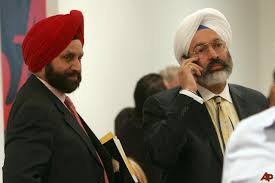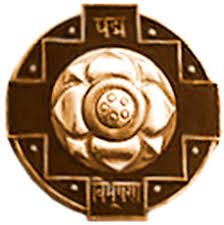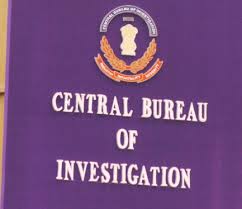Wednesday, February 17, 2010
Centre Trying to Ascertain Facts on Chatwal Cases

In the wake of a controversy surrounding the
Padma Bhushan given to Sant Singh Chatwal, the Centre
is trying to ascertain facts on the allegations of criminal
complaints registered against the NRI hotelier.

"We are trying to ascertain facts," Union Home Secretary
Gopal K Pillai said when asked about the reports that there
are three criminal complaints with Kerala Police, four cases in
Delhi and Kerala High Courts that named Chatwal and his associates.
He, however, made it clear that no probe has been ordered nor
any report sought from anyone.
According to media reports, all the cases against Chatwal were filed
or registered after April 2009 and in two of these cases,
Chatwal was served summons as recently as last month.
The cases reportedly related to "non-payment of bills" by
Chatwal to the suppliers of furnishings to his newly- constructed
Kochi hotel and "criminal intimidation" of them on the night of the launch party.
With the controversy around awarding of Padma Bhushan
to hotelier Sant Singh Chatwal getting stoked further with filing
of PILs against him, BJP today asked the government to rethink its
decision if it wanted to avoid getting "egg on its face".
"Selection of Chatwal has made the whole process
(of choosing Padma awardees) suspect and has lowered the
dignity of the awards. It is the duty of the government to
maintain this dignity as it is also a matter of prestige of the awards,"
BJP spokesperson Rajiv Pratap Rudy said.

He said that BJP was aware of filing of PILs in the case
and also of reports that Chatwal offered to fund Barack
Obama's presidential election campaign but the latter politely declined.
"If the government wants to prevent egg on its face,
it should take appropriate action, lest other institutions
may have to take corrective action," Rudy said.
Some eminent journalists have also filed an RTI application to
know how Chatwal figured in the list of Padma Bhushan awardees.

Reports suggest that though Chatwal's name did not figure in the
initial list, his name was recommended later by the Prime Minister's Office.
Chatwal was earlier indicted by the CBI in a bank fraud case
involving USD 9 million and was even under arrest for a short period.
Courts can order CBI probe without states' nod: SC

New Delhi, February 17:14.40hrs
Siasat daily
The Supreme Court on Wednesday upheld the
constitutional validity of courts' powers to order a
CBI probe without the consent of state governments.
A five-member Constitution Bench, comprising
Chief Justice KG Balakrishnan and justices
RV Raveendran, DK Jain, P Sathasivam and JM
Panchal, unanimously ruled that the Supreme Court and
state High Courts have the authority to order CBI probe
without the consent of the state governments,
if they think the case in question has national
and international ramifications.

Such powers are vested with the apex court and
High Courts to ensure protection of fundamental
rights of citizens under Article 21 of the Constitution,
the Bench said.
 It however added that the courts should observe
It however added that the courts should observecaution while ordering such investigations.
Otherwise, the CBI will be flooded with such
directions in routine cases, the Bench stated.
The SC Bench had earlier reserved its verdict on
December 11, 2008.
The West Bengal government and some others
had contended in the SC that as per Section 5 and 6
of the Delhi Special Police Establishment Act
, under which CBI has been constituted, the
investigating agency can conduct a probe in any state
only with prior consent of the concerned government.
The state government had contended that neither the
High Court nor the apex court has the power to order
a CBI probe into allegation of scandals or on any other issue.
It had also submitted that the power to order a CBI probe
was solely vested with the respective state governments and
even the Central government had no power to order a probe y
the Central agency unless the state concerned gave its consent.
The Centre, however, had contended that there
was no restriction on High Courts and apex court to
order a CBI probe into sensitive cases having national
and international ramifications.
West Bengal was the main petitioner in this case as
it had taken exception to the Calcutta High Court order
for a CBI probe into the Midnapore firing incidents in
which several Trinamool Congress workers were killed.
"There is no restriction on the powers of the courts
(High Courts and apex court) under Articles 226 and 32
of the Constitution for ordering CBI probe in a case," the
Centre had said, adding such power has been with the
courts to protect the fundamental rights of citizens.
 Opposing the Centre's stand, West Bengal had said that if
Opposing the Centre's stand, West Bengal had said that ifsuch powers were vested with the apex court or High Courts,
it would affect the federal structure of the Constitution.
In recent years, the Supreme Court and also various
High Courts had been ordering probe by CBI into high-profile cases.
CBI takes up investigation in Rs one crore bank fraud case
New Delhi, February 16:

CBI has registered a case and started investigations in a
case related to misappropriation of funds worth over
Rs one crore by two former employees of a nationalised
bank in Hyderabad.
The case was registered against cashier K Harikumar
and manager K Ramesh Kumar of Andhra Bank,
Gajularamaram Branch, HAL Colony, Shapurngar, Hyderabad
and other unknown public servants and private persons under different
sections of the IPC and the Prevention of Corruption Act.
 The allegations are that accused Harikumar while
The allegations are that accused Harikumar while
working as cashier in the bank had committed
misappropriation of Rs 57,61,000 and on further enquiry
by the bank it was found that other than the above amount,
another Rs 60,00,000 was issued as pay orders.

"These were notounted for in the bank books.
Many other irregularities have also come to light,"
a CBI spokesperson said here today.
Prior to registration of a case by the CBI on the allegations,
another case was registered on November 11, 2009
by the Jeedimetla police authorities.
During the investigation, Jeedimetla police arrested
the manager of the bank for conspiracy in the offence.
In this case, the fraud amount was above Rs one crore.
 Accordingly, the government of Andhra Pradesh
Accordingly, the government of Andhra Pradesh
transferred the case to CBI for investigation, the
spokesperson said adding that further investigation is continuing

CBI has registered a case and started investigations in a
case related to misappropriation of funds worth over
Rs one crore by two former employees of a nationalised
bank in Hyderabad.
The case was registered against cashier K Harikumar
and manager K Ramesh Kumar of Andhra Bank,
Gajularamaram Branch, HAL Colony, Shapurngar, Hyderabad
and other unknown public servants and private persons under different
sections of the IPC and the Prevention of Corruption Act.
 The allegations are that accused Harikumar while
The allegations are that accused Harikumar whileworking as cashier in the bank had committed
misappropriation of Rs 57,61,000 and on further enquiry
by the bank it was found that other than the above amount,
another Rs 60,00,000 was issued as pay orders.

"These were notounted for in the bank books.
Many other irregularities have also come to light,"
a CBI spokesperson said here today.
Prior to registration of a case by the CBI on the allegations,
another case was registered on November 11, 2009
by the Jeedimetla police authorities.
During the investigation, Jeedimetla police arrested
the manager of the bank for conspiracy in the offence.
In this case, the fraud amount was above Rs one crore.
 Accordingly, the government of Andhra Pradesh
Accordingly, the government of Andhra Pradeshtransferred the case to CBI for investigation, the
spokesperson said adding that further investigation is continuing
Frauds cost clients Rs 4000 crore
Wednesday, February 17, 2010
 A United Nations officer issued a cheque
A United Nations officer issued a cheque
on his nationalized bank account.
The cheque bounced despite his having
deposited a big sum a few days back.
He complained to the bank only to be
told that Rs 75,000 was withdrawn in
a number of transactions in Romania,
a country he has never visited.
 The police suspect that the account was
The police suspect that the account was
hacked on internet.
This is not the lone case of fraudulent
activity in an Indian bank. Bank fraud is
a big business in today's world. With more
educational qualifications, banking is becoming
impersonal and an increase in banking sector has
given rise to this white collar crime.
In many cases, the involvement of bank officials,
as deliberate colluders, is also suspected.
With the introduction of internet universal
banking, the number of bank frauds has more
than doubled in five years. There were 10,450 cases
of such cases in 2004-05, which rose to 13,914
in 2005-06 and 23, 914 in 2008-09.
 The figures are as per cases recorded with
The figures are as per cases recorded with
the Central Bureau of Investigation.
It is assumed that there are many more cases,
which are settled at the banks' end and no
complaints are lodged officially.
The frauds have cost the depositors Rs 779 crore in
2004-05. It almost doubled to Rs 1381 crore the next
year. In 2008-09, the figure rose to Rs 1883 crore.
The figures given - Rs 4,043 crore in these deals -
are again not conclusive.

The actual figure may be much more.
Both bank and forensic officials are baffled
at this massive level of fraud. In 2004-05,
there were 96 cases in which over Rs 1 crore
was swindled away in each transaction.
This rose to 212 in 2008-09.
Apparently no depositor is safe.
Chances of swindling increase seemingly
with the size of the bank. A multi-crore
fake cheques scam estimated to the tune of
Rs 52 crore was exposed in the Kanpur main
branch of the State Bank of India last August.
 Seven bank officials, including one assistant
Seven bank officials, including one assistant
general manager and two chief managers were
suspended. The bank's audit team found that
the fraud involved clearing of fake cheques in
the bank account of an influential petrol pump
owner. He is believed to have fled the country.
This is stated to be the biggest fraud
in the Kanpur-Lucknow region.
This banking fraud is basically classified as
fraud by insider and fraud by others.
It involves a highly placed insider nominally
authorized to invest sizeable funds on behalf of
the bank; as it happened in the Kanpur case.
This person secretly makes aggressive and risky
investments using the bank's money and when one
investment goes bad, he engages in further market
speculation in the hope of a quick profit, which
would hide or cover the loss. Many such transactions
found their way even to the stock market though
investments in other speculative activities are
also not uncommon.
Unfortunately, when one investment loss is
piled onto another, the costs to the bank
can reach into hundreds of crore of rupees.

Remember, many of the US and western banks
went out of business for such activities in 2008.
The banking fraud is classified as fraudulent
loans, wire frauds, forged or fraudulent documents,
uninsured deposits, theft of identity, demand draft
frauds, forgery and altered cheques, accounting fraud,
bill discounting fraud, credit card fraud, fraudulent
loan applications, phishing and internet frauds.
While some of these existed in one or the other form
even earlier, the magnitude was far less. New technology
has added to the woes of the investigators as it
not only involved complex accounting processes but
also complicated technology and software applications.

A computer crime may be committed in one country and
its result can be found in another country.
There has been a lot of jurisdictional problem
and though the Interpol helps, it too has its
limitations. Different treaties and conventions
have created obstructions in relation to tracking
of cyber criminals hiding or operating in other nations.
It is described as a no-scene crime. The usual crime
scene is the cyber space. The terminal may be anywhere
and the criminal need not indicate the place. The only
evidence a criminal leaves behind is the loss to the bank.
The major advantage the criminal has in instituting a
computer crime is that there is no personal exposure,
no written documents, no signatures, no fingerprints
or voice recognition. The criminal is truly and in the
strict sense faceless.
There are certain spy softwares which are utilized
to find out passwords and other vital entry information
to a computer system. The entry is gained through a spam
or bulk mail. This is called phishing.

A number of programmes called "Trojan horse"
programmes have also been used to snoop on the
internet users while online, capturing keystrokes
or confidential data.
The information thus stolen is then used in
other frauds, such as theft of identity or
online fraud. Though using debit and ATM card
is stated to be safe by banks, technological
experts say that pin numbers and other details
can easily be cloned or pilfered and misused as
one feeds the machine.
The experts also advice not to put
credit card ATM details ever on the internet
for any kind of transactions. The information
travels to a chain of computers and could be
intercepted at any point.
International internet transactions are
always fraught with risk. The CBI and banks
are now putting their heads together to
create a firewall and improve the forensic
techniques. However, the nature of transaction
that has to allow access to the accounts of
the banks pose a daunting challenge. Some elements
have suggested closing the direct internet transactions
at least at international level.
It is a matter of probe whether terrorist
groups are part of cyber crime or not.
The existing Indian laws are not at all adequate
to counter cyber crimes. The Indian Penal Code,
Evidence Act, and Criminal Procedure Code have no
clue about computers when they were codified.
The IT Act is there but it is inadequate.
Banks are clueless at stopping this crime.

The alternate is to utilize the banking services
in the conventional paper method till a
foolproof system evolves.
By Shivaji Sarkar
 A United Nations officer issued a cheque
A United Nations officer issued a cheque on his nationalized bank account.
The cheque bounced despite his having
deposited a big sum a few days back.
He complained to the bank only to be
told that Rs 75,000 was withdrawn in
a number of transactions in Romania,
a country he has never visited.
 The police suspect that the account was
The police suspect that the account washacked on internet.
This is not the lone case of fraudulent
activity in an Indian bank. Bank fraud is
a big business in today's world. With more
educational qualifications, banking is becoming
impersonal and an increase in banking sector has
given rise to this white collar crime.
In many cases, the involvement of bank officials,
as deliberate colluders, is also suspected.
With the introduction of internet universal
banking, the number of bank frauds has more
than doubled in five years. There were 10,450 cases
of such cases in 2004-05, which rose to 13,914
in 2005-06 and 23, 914 in 2008-09.
 The figures are as per cases recorded with
The figures are as per cases recorded with the Central Bureau of Investigation.
It is assumed that there are many more cases,
which are settled at the banks' end and no
complaints are lodged officially.
The frauds have cost the depositors Rs 779 crore in
2004-05. It almost doubled to Rs 1381 crore the next
year. In 2008-09, the figure rose to Rs 1883 crore.
The figures given - Rs 4,043 crore in these deals -
are again not conclusive.

The actual figure may be much more.
Both bank and forensic officials are baffled
at this massive level of fraud. In 2004-05,
there were 96 cases in which over Rs 1 crore
was swindled away in each transaction.
This rose to 212 in 2008-09.
Apparently no depositor is safe.
Chances of swindling increase seemingly
with the size of the bank. A multi-crore
fake cheques scam estimated to the tune of
Rs 52 crore was exposed in the Kanpur main
branch of the State Bank of India last August.
 Seven bank officials, including one assistant
Seven bank officials, including one assistant general manager and two chief managers were
suspended. The bank's audit team found that
the fraud involved clearing of fake cheques in
the bank account of an influential petrol pump
owner. He is believed to have fled the country.
This is stated to be the biggest fraud
in the Kanpur-Lucknow region.
This banking fraud is basically classified as
fraud by insider and fraud by others.
It involves a highly placed insider nominally
authorized to invest sizeable funds on behalf of
the bank; as it happened in the Kanpur case.
This person secretly makes aggressive and risky
investments using the bank's money and when one
investment goes bad, he engages in further market
speculation in the hope of a quick profit, which
would hide or cover the loss. Many such transactions
found their way even to the stock market though
investments in other speculative activities are
also not uncommon.
Unfortunately, when one investment loss is
piled onto another, the costs to the bank
can reach into hundreds of crore of rupees.

Remember, many of the US and western banks
went out of business for such activities in 2008.
The banking fraud is classified as fraudulent
loans, wire frauds, forged or fraudulent documents,
uninsured deposits, theft of identity, demand draft
frauds, forgery and altered cheques, accounting fraud,
bill discounting fraud, credit card fraud, fraudulent
loan applications, phishing and internet frauds.
While some of these existed in one or the other form
even earlier, the magnitude was far less. New technology
has added to the woes of the investigators as it
not only involved complex accounting processes but
also complicated technology and software applications.

A computer crime may be committed in one country and
its result can be found in another country.
There has been a lot of jurisdictional problem
and though the Interpol helps, it too has its
limitations. Different treaties and conventions
have created obstructions in relation to tracking
of cyber criminals hiding or operating in other nations.
It is described as a no-scene crime. The usual crime
scene is the cyber space. The terminal may be anywhere
and the criminal need not indicate the place. The only
evidence a criminal leaves behind is the loss to the bank.
The major advantage the criminal has in instituting a
computer crime is that there is no personal exposure,
no written documents, no signatures, no fingerprints
or voice recognition. The criminal is truly and in the
strict sense faceless.
There are certain spy softwares which are utilized
to find out passwords and other vital entry information
to a computer system. The entry is gained through a spam
or bulk mail. This is called phishing.

A number of programmes called "Trojan horse"
programmes have also been used to snoop on the
internet users while online, capturing keystrokes
or confidential data.
The information thus stolen is then used in
other frauds, such as theft of identity or
online fraud. Though using debit and ATM card
is stated to be safe by banks, technological
experts say that pin numbers and other details
can easily be cloned or pilfered and misused as
one feeds the machine.
The experts also advice not to put
credit card ATM details ever on the internet
for any kind of transactions. The information
travels to a chain of computers and could be
intercepted at any point.
International internet transactions are
always fraught with risk. The CBI and banks
are now putting their heads together to
create a firewall and improve the forensic
techniques. However, the nature of transaction
that has to allow access to the accounts of
the banks pose a daunting challenge. Some elements
have suggested closing the direct internet transactions
at least at international level.
It is a matter of probe whether terrorist
groups are part of cyber crime or not.
The existing Indian laws are not at all adequate
to counter cyber crimes. The Indian Penal Code,
Evidence Act, and Criminal Procedure Code have no
clue about computers when they were codified.
The IT Act is there but it is inadequate.
Banks are clueless at stopping this crime.

The alternate is to utilize the banking services
in the conventional paper method till a
foolproof system evolves.
By Shivaji Sarkar
RBI Amendment of money Laundering Rules
| Date : Feb 03 2010 | |
| UCBs - Prevention of Money-laundering - Amendment Rules, 2009 - Obligation of banks / Financial institutions | |
|
PVR terminates deal with DLF
February 16, 2010 02:10 IST

PVR Cinemas has decided to terminate its agreement
to acquire real estate developer DLF's exhibition
hall business, DT Cinemas. PVR informed the stock
exchanges today that, 'the conditions precedent for
the acquisition have still not been satisfied'.
The two companies had sought an extension till February
15 to conclude the deal. "The parties to the acquisition
agreement have mutually agreed not to further extend the
period for completion of the conditions precedent under
the acquisition agreement," said PVR to the Bombay Stock
Exchange . Initially, the PVR shares were to be allotted in January.
Nitin Sood, CFO, PVR, said: "We will continue to look at
inorganic growth in the domestic multiplex space. DT Cinemas
was one such option which we were exploring and, unfortunately,
it didn't work out. On the organic front, we intend to open 70 to 80
screens by 2011."

According to industry sources, DLF does not want to sell its theatre
business. "DLF has mall properties coming up and they believe they
can manage the cinema exhibition business on their own .
As a result, they changed their mind," said sources.
In November 2009, PVR had announced a cash-and-stock deal to
buy out DT Cinemas. Under the deal, PVR would issue 2.5 million
shares to DT Cinemas, representing 10 per cent of PVR's fully
diluted paid-up capital. Its market capitalisation at that time
was around Rs 322 crore. In addition, PVR would also pay Rs 20.2 crore
for the acquisition, putting the total deal value at roughly Rs 50 crore.
DT Cinemas has a portfolio of 29 screens located in Delhi
, Gurgaon and Chandigarh. All the acquired cinemas
are on long-term lease in various mall developments owned and
operated by the DLF Group. This acquisition would have
strengthened PVR's presence in the National Capital Region.
PVR currently operates 108 screens and the DT deal would have
raised this to 137. Further, under the alliance,
PVR would have had exclusive rights to operate as a key
anchor multiplex partner in all future mall developments
by the DLF Group. DLF had a slew of future mall developments
planned in key markets in Delhi, Mumbai Chennai,
Hyderabad, Noida, Jalandhar and Lucknow
At the time of the announcement, industry experts had raised
questions on whether PVR's revenues wouldn't be cannibalised, since
PVR screens are located close to DT screens in many areas.
Even without DT Cinemas coming into its kitty, PVR controls 60-70 per
cent of screens in the Gurgaon-Delhi region. The oldest multiplex player,
it was ousted from its second position by the INOX-Fame India deal.
INOX's acquisition of Fame has increased its screen count to 204
screens, almost double of what PVR operates at the moment.

PVR Cinemas has decided to terminate its agreement
to acquire real estate developer DLF's exhibition
hall business, DT Cinemas. PVR informed the stock
exchanges today that, 'the conditions precedent for
the acquisition have still not been satisfied'.
The two companies had sought an extension till February
15 to conclude the deal. "The parties to the acquisition
agreement have mutually agreed not to further extend the
period for completion of the conditions precedent under
the acquisition agreement," said PVR to the Bombay Stock
Exchange . Initially, the PVR shares were to be allotted in January.
Nitin Sood, CFO, PVR, said: "We will continue to look at
inorganic growth in the domestic multiplex space. DT Cinemas
was one such option which we were exploring and, unfortunately,
it didn't work out. On the organic front, we intend to open 70 to 80
screens by 2011."

According to industry sources, DLF does not want to sell its theatre
business. "DLF has mall properties coming up and they believe they
can manage the cinema exhibition business on their own .
As a result, they changed their mind," said sources.
In November 2009, PVR had announced a cash-and-stock deal to
buy out DT Cinemas. Under the deal, PVR would issue 2.5 million
shares to DT Cinemas, representing 10 per cent of PVR's fully
diluted paid-up capital. Its market capitalisation at that time
was around Rs 322 crore. In addition, PVR would also pay Rs 20.2 crore
for the acquisition, putting the total deal value at roughly Rs 50 crore.
DT Cinemas has a portfolio of 29 screens located in Delhi
, Gurgaon and Chandigarh. All the acquired cinemas
are on long-term lease in various mall developments owned and
operated by the DLF Group. This acquisition would have
strengthened PVR's presence in the National Capital Region.
PVR currently operates 108 screens and the DT deal would have
raised this to 137. Further, under the alliance,
PVR would have had exclusive rights to operate as a key
anchor multiplex partner in all future mall developments
by the DLF Group. DLF had a slew of future mall developments
planned in key markets in Delhi, Mumbai Chennai,
Hyderabad, Noida, Jalandhar and Lucknow
At the time of the announcement, industry experts had raised
questions on whether PVR's revenues wouldn't be cannibalised, since
PVR screens are located close to DT screens in many areas.
Even without DT Cinemas coming into its kitty, PVR controls 60-70 per
cent of screens in the Gurgaon-Delhi region. The oldest multiplex player,
it was ousted from its second position by the INOX-Fame India deal.
INOX's acquisition of Fame has increased its screen count to 204
screens, almost double of what PVR operates at the moment.
The Direct Tax Code: How are you affected?
The year 2009 was a landmark year for Indian taxes. In this year, the government introduced the landmark Bill, The Direct Taxes Code Bill. It is going to affect all of us as it will not only alter the tax you pay, but will also impact your investments, borrowings, and expenses. Here is how it will affect all of us. |
Changes in Tax Slabs:
The biggest impact of the new tax system is the significan
t widening of income slabs.
According to this, people with annual income not exceeding
According to this, people with annual income not exceeding
1.6 lakhs will not have to pay any tax.
For those with an annual income from Rs. 1.6 lakhs to
For those with an annual income from Rs. 1.6 lakhs to
Rs. 10 lakhs, you pay tax at 10%; for incomes from
Rs. 10 lakhs to Rs. 25 laks the tax is 20% and 30% for
incomes exceeding Rs. 25 lakhs.
So if your annual income is Rs. 2 lakhs, you fall in the 10% tax slab.
So if your annual income is Rs. 2 lakhs, you fall in the 10% tax slab.
These rates and slabs would be applicable from the financial year 2011-12.
However with this move the government plans to make most of your
However with this move the government plans to make most of your
allowances taxable. Hence if you are a high earner, earning a lot
of allowances, your tax liability will go up significantly.
Effect On Capital Gains:
As per the new tax code, both the short-term and long-term capital
gains are treated equally.
It recommends making both the contribution and return from your
It recommends making both the contribution and return from your
investments tax-free but proposes to tax the maturity proceeds.
This will affect your stocks and equity mutual funds.
This is different from the present system, in which the maturity proceeds are tax-free.
Impact on tax savings: With the introduction of this code,
Impact on tax savings: With the introduction of this code,
the government has eliminated the various tax breaks.
However the government has hiked the tax savings limit to
Rs. 3 lakhs per annum, while restricting the available investment alternatives.
So now you can invest only in PPF, EPF, life insurance, superannuation
So now you can invest only in PPF, EPF, life insurance, superannuation
funds and NPS. Besides you can also claim tax benefits on your children's
education. But no more tax benefits for investing in NSCs, Senior Citizens
Savings Scheme, tax-saving bank FDs and ELSS.
Impact on home loans:
As of now, if you have taken a home loan, the interest
payments up to Rs. 1.5 lakh and up to Rs. 1 lakh towards
principal repayment are eligible for tax benefit. But this
is set to end once the new code comes into effect.
So if you have paid Rs 3 lakhs as interest and Rs 2 lakhs
So if you have paid Rs 3 lakhs as interest and Rs 2 lakhs
as principal, you will not get any tax benefit. But if you have
rented out a home, you can still avail of the tax benefits for
taking the home loan.
The exemptions allowed: With the code, the government aims
The exemptions allowed: With the code, the government aims
to tax the maturity proceeds of PPF as well as insurance.
However in case of insurance, deduction will be given only for
the sum obtained only if the premium payable is not more than 5% of
the sum assured and the sum assured is obtained only when the
insurance term is over.
For PPF, the balance in the account as
For PPF, the balance in the account as
of 31st March 2010 won't be taxed on withdrawal.
Effect of new tax code:
Here is a simple example to help figure the
effect of the new tax code.
Rahul is a salaried employee. His annual salary is
Rahul is a salaried employee. His annual salary is
Rs. 5 lakhs. He has invested Rs. 50,000 in mutual
funds, Rs. 20,000 in insurance and Rs 40,000 in PPF
. Moreover he has taken a home loan of which he has
already paid Rs. 80,000 as principal and Rs. 1 lakh as
interest. Let us see how his situation will change once
the new tax code comes into effect.
Rahul's present situation: Currently Rahul gets tax benefit
Rahul's present situation: Currently Rahul gets tax benefit
on the amounts he has invested in PPF, mutual funds,
insurance as well as on the principal repayment of his home loan.
The limit on this amount is Rs 1 lakh. Besides Rahul has also paid
interest on his home loan. So the total amount tax exempted is
Rs. 2 lakhs (Rs. 1 lakh tax exemption under section 80C and Rs. 1 lakh
as interest on home loan.).
Hence now Rahul's taxable amount is Rs. 3 lakhs.
Hence now Rahul's taxable amount is Rs. 3 lakhs.
(Rs 5 lakhs of salary - Rs. 2 lakhs of amount exempted).
So the total tax that Rahul will pay on the
amount of Rs. 3 lakhs is Rs. 15,000
(Rs. 3 lakhs - Rs. 1.5 lakhs = Rs. 1.5 lakhs is the taxable
amount and the tax rate applicable is 10%).
So as of now, he is paying Rs. 15,000 as tax.
Rahul's situation after the new code: Rahul's total amount
exempted from tax is Rs. 1.1 lakhs (total of his amounts invested
in mutual funds, PPF and insurance) + Rs 1 lakh paid
towards home loan interest. So his tax exempted amount goes up to Rs. 2.1 lakhs.
His total taxable income now becomes Rs. 2.9 lakhs.
His total taxable income now becomes Rs. 2.9 lakhs.
Ultimately he ends up paying Rs. 13,000
(Rs. 2.9 lakhs - Rs. 1.6 lakhs = Rs. 1.3 lakhs that is taxed at 10%).
Rahul will now save Rs. 2000 in tax. He can do this because
Rahul will now save Rs. 2000 in tax. He can do this because
with the new tax code, the government plans to hike the tax slabs
. While the original tax slab for which tax was not applied was
0-Rs. 1.5 lakhs, the upper limit after the tax code comes into
effect goes up to Rs. 1.6 lakhs.
Moreover the new code has hiked the tax exemption
Moreover the new code has hiked the tax exemption
limits to 3 lakhs from present limit of Rs. 1 lakh.
Inertia covers vision in India budget
By Alistair Scrutton/Soudi Gazette
The Indian government’s first full-year budget
since its resounding re-election may signal
that increasing populism and ruling coalition
infighting will triumph over policies to
liberalize the economy and cut record borrowing.
This could be the year for India. The world is
looking for motors of growth in Asia, the
$1.2 trillion Indian economy is recovering
faster than expected and the Congress-party
led coalition also enjoys a clear majority in
parliament.
In theory, the budget could allow Finance Minister
Pranab Mukherjee to cut a record $97 billion government
borrowing, and streamline taxes and push sales of state
firms and a 3G mobile phone licence auction to bring
in billions of dollars.
Instead, the 74-year-old Congress party stalwart may
ignore all that and produce a simple statement of accounts
on Feb. 26. It would send a signal Congress increasingly
broadcasts in its second term – don’t rock the boat.
It underlines that while Prime Minister Manmohan Singh
preaches reforms, pressure from Congress rank and file
to focus on social programs combined with Mukherjee’s own
reputation as a safe, if uninspiring, pair of hands may
overshadow any vision.

looking for motors of growth in Asia, the
$1.2 trillion Indian economy is recovering
faster than expected and the Congress-party
led coalition also enjoys a clear majority in
parliament.
In theory, the budget could allow Finance Minister
Pranab Mukherjee to cut a record $97 billion government
borrowing, and streamline taxes and push sales of state
firms and a 3G mobile phone licence auction to bring
in billions of dollars.
Instead, the 74-year-old Congress party stalwart may
ignore all that and produce a simple statement of accounts
on Feb. 26. It would send a signal Congress increasingly
broadcasts in its second term – don’t rock the boat.
It underlines that while Prime Minister Manmohan Singh
preaches reforms, pressure from Congress rank and file
to focus on social programs combined with Mukherjee’s own
reputation as a safe, if uninspiring, pair of hands may
overshadow any vision.

“This is a government that really does not have a mission,”
said D.H. Pai Panandikar, head of the private think-tank
RPG Foundation. “It is reactive. Don’t expect vision in the budget.”
But one senior government official cautioned that the budget speech
was not yet written, and there were some signs of pressure for the
finance minister to present a more reform-driven budget.
“People are trying to persuade him (Mukherjee) to go beyond
an AFS (annual financial statement),” the official said.
Social spending
The budget could push new social programs such as offering
subsidized wheat and rice to the poor. Another program, the
rural employment guarantee scheme that provides jobs for
millions of villagers, costs India about one percent of GDP.
With little will to cut spending, government borrowing may
remain at a record 4.51 trillion rupees ($97 billion) and
possibly put further pressure on interest rates.
The government debt-to-GDP ratio is just under 80 percent,
almost double the norm for emerging Asian markets.
“Clearly there is a concern in the market over the political
constraints,” said Vineet Malik, head
of interest rates at HSBC India.
It should not have been like this.
In Congress’s first term, the communist parties it rel
ied on for parliamentary support were blamed for the
government’s slow progress in liberalizing Asia’s
third-largest economy. Since its election win, those
communist shackles have disappeared. But Congress,
which oversaw a heavily state-run economy for decades
after independence in 1947, now seems prisoner to its
leftist roots despite flirtation with reform under Singh.
The government’s first deficit-laden interim budget in July,
just after its election victory, disappointed many investors
with a 36 percent spending hike funded by record borrowing.
The government’s recent decision to delay the launch of its
first genetically modified (GM) vegetable was also criticised
as pandering to its farmer voter base rather than science.
Reform? No thanks
At the crux of the problem, though, is that Congress may just
not have its heart in market reform.
“The problem was never the communists.
The problem was within Congress itself,”
said Jahangir Aziz, a JP Morgan economist in Mumbai.
“There is no real consensus within the party on these issues.
Mukherjee is a wily old-timer who is one of the most powerful
men in India. He knows how to balance the competing needs of
India’s 28 disparate states – a complex cauldron representing
1.2 billion people and a myriad of castes and ethnicities.
“The finance minister is not gung-ho about liberalism.
He’s the old school of Congress,” said economic analyst
Paranjoy Guha Thakurta. “He believes that India’s socialist
past was not an unmitigated disaster.”
But there have been some initiatives, including announcing
more sales of stakes in state companies and a streamlining of
taxes.
said D.H. Pai Panandikar, head of the private think-tank
RPG Foundation. “It is reactive. Don’t expect vision in the budget.”
But one senior government official cautioned that the budget speech
was not yet written, and there were some signs of pressure for the
finance minister to present a more reform-driven budget.
“People are trying to persuade him (Mukherjee) to go beyond
an AFS (annual financial statement),” the official said.
Social spending
The budget could push new social programs such as offering
subsidized wheat and rice to the poor. Another program, the
rural employment guarantee scheme that provides jobs for
millions of villagers, costs India about one percent of GDP.
With little will to cut spending, government borrowing may
remain at a record 4.51 trillion rupees ($97 billion) and
possibly put further pressure on interest rates.
The government debt-to-GDP ratio is just under 80 percent,
almost double the norm for emerging Asian markets.
“Clearly there is a concern in the market over the political
constraints,” said Vineet Malik, head
of interest rates at HSBC India.
It should not have been like this.
In Congress’s first term, the communist parties it rel
ied on for parliamentary support were blamed for the
government’s slow progress in liberalizing Asia’s
third-largest economy. Since its election win, those
communist shackles have disappeared. But Congress,
which oversaw a heavily state-run economy for decades
after independence in 1947, now seems prisoner to its
leftist roots despite flirtation with reform under Singh.
The government’s first deficit-laden interim budget in July,
just after its election victory, disappointed many investors
with a 36 percent spending hike funded by record borrowing.
The government’s recent decision to delay the launch of its
first genetically modified (GM) vegetable was also criticised
as pandering to its farmer voter base rather than science.
Reform? No thanks
At the crux of the problem, though, is that Congress may just
not have its heart in market reform.
“The problem was never the communists.
The problem was within Congress itself,”
said Jahangir Aziz, a JP Morgan economist in Mumbai.
“There is no real consensus within the party on these issues.
Mukherjee is a wily old-timer who is one of the most powerful
men in India. He knows how to balance the competing needs of
India’s 28 disparate states – a complex cauldron representing
1.2 billion people and a myriad of castes and ethnicities.
“The finance minister is not gung-ho about liberalism.
He’s the old school of Congress,” said economic analyst
Paranjoy Guha Thakurta. “He believes that India’s socialist
past was not an unmitigated disaster.”
But there have been some initiatives, including announcing
more sales of stakes in state companies and a streamlining of
taxes.
Quotegems for the Day :
Why not upset the apple cart? If you don't, the apples will rot anyway. -Frank A Clark
posted by:http://uk.groups.yahoo.com/group/quotegems/
Budget wish list-Suchin pilot Wish list for IT sector
NEW DELHI: Minister of State for IT and Telecom Sachin Pilot
on Tuesday expressed hope that the exemptions and benefits
given to the Indian ITfirms would be extended in the
upcoming Budget to help them cope with the slowdown.
"It is important that we have a view which will foster
investment and create job opportunities. The IT sector
has been growing...and so we hope the exemptions and
benefits that the IT sector has been getting, there
would be some more relief given," Pilot told reporters here.
The sector currently employs about 2.5 million people directly
and about eight million indirectly.
"It is expected that another one lakh people would be added
this year," Pilot said.
The Indian IT sector was hit by the global financial meltdown
and the strengthening dollar pulled it down further.
The industry has been demanding further extension of the sunset
clause for deduction in respect of export profits under sections
10A and 10B of the Income Tax Act. This was extended in the last
Budget to March 2010.
While IT companies pay a minimum alternative tax of 15 per cent,
which was raised by 4 per cent in the last Budget, their effective
tax rate is still around 20 per cent. When the STPI scheme ends,
this will go up further.
The companies have also been demanding clarity in policy matters,
especially SEZ and Direct Tax code.
"There are certianly ambiguities in the direct tax code which is
not a budget issue but we have raised it and in case of SEZ,
clarification and so on," Tata Consultancy Services Executive
Director and Chief Financial Officer S Mahalingam said.
The extension of the tax holiday for a longer period was
a good idea for the industry as a whole, added Mahalingam.
According to industry body Nasscom, India's software and BPO
exports are expected to grow at an annual 13-15 per cent to
touch $56-57 billion.
Quotegems for the Day :
Why not upset the apple cart? If you don't, the apples will rot anyway. -Frank A Clark
posted by http://uk.groups.yahoo.com/group/quotegems/message/1644
Subscribe to:
Comments (Atom)






